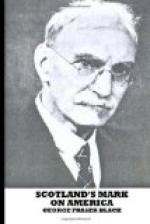NORTH CAROLINA. William Drummond, Governor of “Albemarle County Colony” (i.e., North Carolina), was a native of Perthshire, a strenuous upholder of the rights of the people, and ranks as one of the earliest of American patriots. He took a prominent part in “Bacon’s Rebellion” in 1676, “an insurrection that was brought about by the insolence and pig-headedness of Sir William Berkeley, then Governor of Virginia,” and was executed the same year. Gabriel Johnston (1699-1752), Governor (1734-52), was born in Scotland, and held the Professorship of Oriental Languages in St. Andrews University before coming to the colonies. Johnston County is named after him. Matthew Rowan was President of Council and Acting Governor in 1753. Alexander Martin (1740-1807), was fourth and Acting Governor, 1782-84, and from 1789 to 1792. Samuel Johnston (1733-1816), sixth Governor (1788-89), four years Senator, and Justice of the Supreme Court from 1800-1803. Bancroft says the movement for freedom was assisted by “the calm wisdom of Samuel Johnston, a native of Dundee, in Scotland, a man revered for his integrity, thoroughly opposed to disorder and revolution, if revolution could be avoided without yielding to oppression.”
SOUTH CAROLINA. Richard Kirk, Governor (1684). James Glen, born in Linlithgow in 1701, Governor (1743-56). Lord William Campbell, third brother of the fifth Duke of Argyll, Governor (1775). John Rutledge (1739-1800), brother of Edward Rutledge the Signer, was President of South Carolina (1776-78) and first Governor (1779-82). He was later a delegate to the Constitutional Convention in 1787, Associate Justice of the United States Supreme Court (1789-91), Chief Justice of South Carolina (1791-95), and in 1795 appointed Chief Justice of the United States Supreme Court.




